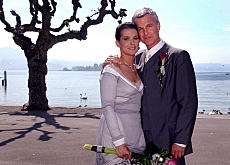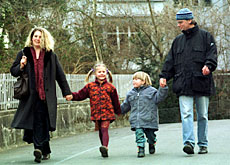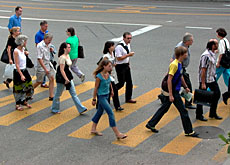Fewer marriages but more divorces

Last year there was a significant increase in the number of divorces and births in Switzerland.
There was also a decrease in the number of marriages and deaths, according to figures released by the Federal Statistics Office on Friday.
They show that there were 73,100 children born, which is 1.7 per cent more than the previous year. The number of births has remained stable since 2001, after falling by almost 15 per cent in the 1990s.
The average number of births per woman has increased slightly, going up from 1.39 in 2003 to 1.42 in 2004. In comparison, there were more than two children per woman in 1970.
The birth rate is higher among foreign women (1.89) than the Swiss (1.26).
Deaths down
A total of 60,200 people died last year in Switzerland, the lowest number in the past 15 years. The drop of 4.6 per cent compared with 2003 can be explained by the lack of a heat wave in 2004, according to the statistics office.
The natural growth of the population, that is the difference between births and deaths, reached 12,900 in 2004, compared with 8,800 in 2003. This is the highest level since 2000, but the figure exceeded 20,000 at the beginning of the 1990s.
Single and divorced women as well as widows are increasingly giving birth. In 2004, the proportion of births out of wedlock, which was 3.8 per cent in 1970, rose to 13.3 per cent.
The average age of marrying and giving birth for the first time continue to rise. In 2004, women were on average 28.6 years old when marrying for the first time, compared with 28.4 years old in 2003 and 25.4 years old in 1970.
Men married on average for the first time when they were 30.8 years old (30.6 in 2003).
Women on average gave birth to their firstborn child at the age of 29.3 years (29.1 in 2003).
Marriage and divorce
About 39,500 couples married in 2004, which is 1.5 per cent less than the previous year. The decline in marriages has been taking place since 1992 when there were more than 45,000 – with the exception of the years 1999 and 2002.
There were 17,900 divorces in 2004, or 6.8 per cent more than the previous year, the steepest rise since 1988. If last year’s figure remains constant, the office expects that 44 per cent of all marriages will end in divorce.
The average life expectancy of the Swiss population has increased by six months for both sexes. It has risen from 78 to 78.6 years old for a newborn male and from 83.2 to 83.7 years old for a newborn female.
Pensioners can also expect to enjoy a longer life. A man of 65 can hope to live another 18.1 years on average (17.5 years in 2003) and a woman of the same age another 21.5 years (21).
swissinfo with agencies
The population in Switzerland rose in 2004.
The number of births (73,100) was higher than the number of deaths (60,200).
Life expectancy continues to rise (by six months).
It is now 78.6 years for men and 83.7 years for women.

In compliance with the JTI standards
More: SWI swissinfo.ch certified by the Journalism Trust Initiative


You can find an overview of ongoing debates with our journalists here. Please join us!
If you want to start a conversation about a topic raised in this article or want to report factual errors, email us at english@swissinfo.ch.